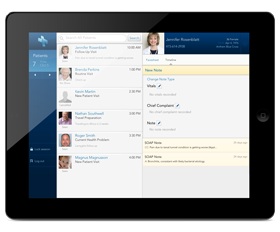 The transaction for Practice Fusion's acquisition of Ringadoc included a transfer of $2 million in Practice Fusion equity, according to an SEC document. It's unclear exactly how the equity sale fits in with the acquisition, but in all likelihood Ringadoc's investors and owners now hold a $2 million stake in Practice Fusion.
The transaction for Practice Fusion's acquisition of Ringadoc included a transfer of $2 million in Practice Fusion equity, according to an SEC document. It's unclear exactly how the equity sale fits in with the acquisition, but in all likelihood Ringadoc's investors and owners now hold a $2 million stake in Practice Fusion.
“Practice Fusion filed a Form D yesterday with the SEC in connection with the previously announced acquisition of Ringadoc. Beyond that, we’re not able to disclose financial details,” the company said in a statement emailed to MobiHealthNews.
Practice Fusion acquired Ringadoc two weeks ago for an undisclosed sum. Los Angeles-based Ringadoc was originally incubated in Practice Fusion’s San Francisco offices around the same time as another startup, 100Plus. Both startups received an angel investment from Practice Fusion CEO Ryan Howard and both ended up being acquired by the company, too.
Ringadoc, founded in 2010, had raised at least $1.9 million from investors including Founders Fund’s FF Angel; Howard; Sharon Knight, the former president of concierge-style health provider One Medical Group; Siemer VC; Telegraph Hill Group; and Dr. Lyle Dennis, who is the Chief of Neurology at Bon Secours Health System.
Practice Fusion, which many have speculated is heading toward IPO, has raised money twice. They raised $70 million last September in a round led by Kleiner Perkins Caufield & Byers, with additional contributions from OrbiMed Advisors, Deerfield Management Company, and Industry Ventures. Then in December, they rounded that raise out with an additional $15 million from Qualcomm Ventures. Overall, including this $2 million, the company has raised $151 million.
Correction: A previous version of this story put the company's total funding at $85 million. That's actually just the total of Practice Fusion's latest round.
The company has been growing rapidly of late, as can be seen from statistics the company released in July. At the time, they said they were in 150 health systems, 364 labs, and 58 imaging facilities and radiology clinics. They had signed 120 deals since the start of 2014, leading to a total of more than 440 enterprise partners.
Practice Fusion is disrupting the traditional networked, PC-based EHR model with a free, cloud-based EHR. They make money by marketing content from pharmaceutical companies within the interface, as well as through two spin-off products they launched last year.
They include Practice Fusion Insight, an analytics platform meant to give physicians, insurers, researchers, pharmaceutical companies and industry analysts highly granular intelligence about populations of patients. Owing to a user base of more than 100,000 medical professionals, the company says it has a clinical dataset four times larger than the Kaiser Permanente and Veterans Administration systems combined, which Insight will tap into.
Shortly after launching Insight, Practice Fusion launched Patient Fusion, an appointment booking and physician review website, which also offers a secure means of communication between doctors and patients, including patient access to medical records and cost tools.

















